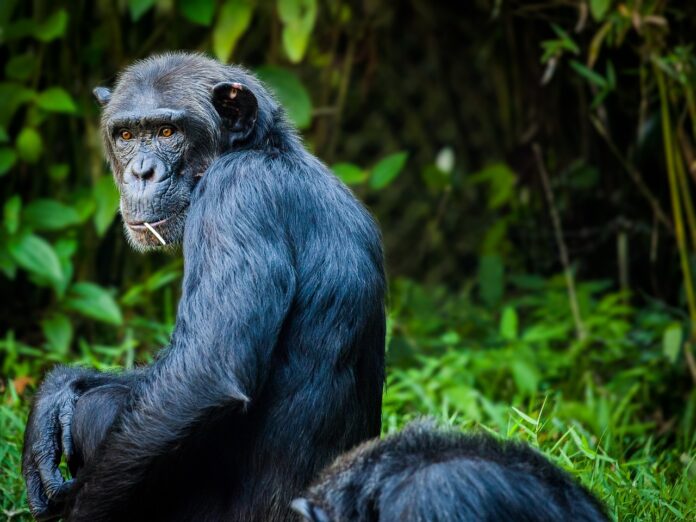Chimpanzees are some of the most intelligent and fascinating animals on the planet. Belonging to the great ape family, they share about 99% of their DNA with humans, making them our closest living relatives. These remarkable primates are native to the forests and savannas of Africa and have captivated the world with their complex behaviors, advanced problem-solving skills, and rich social structures.
Description of the Species
- Physical Characteristics: Chimpanzees are medium-sized primates, with males typically weighing between 40-60 kg (88-132 lbs) and females slightly less. They have long arms, short legs, and a robust build.
- Lifespan: In the wild, chimpanzees can live up to 40-50 years, while in captivity, they can live even longer, sometimes reaching 60 years. Their lifespan is influenced by factors such as diet, habitat, and access to medical care.
- Habitat: Chimpanzees highly adaptable and can live in a variety of environments, from dense forests to open grasslands. However, they prefer areas with plenty of trees, where they build nests to sleep in each night.
- Reproduction: Female chimpanzees typically reach sexual maturity around 13 years of age. They give birth to a single offspring after a gestation period of about 8 months. The bond between mother and infant is strong, and the young chimpanzee remains dependent on its mother for several years. Infants are weaned at around 3-4 years old but continue to stay close to their mothers until they reach adolescence.
Interesting Facts About Chimpanzees:
- Communication: Chimpanzees have a sophisticated system of communication that includes vocalizations, facial expressions, and gestures. They can express a wide range of emotions, including happiness, anger, sadness, and fear. Researchers have identified more than 30 different vocal sounds used by chimpanzees to convey messages to each other.
- Tool Use: One of the most fascinating behaviors of chimpanzees is their use of tools. They have been seen fashioning tools from sticks, leaves, and rocks to assist in tasks like foraging for food or grooming. This ability to use and modify objects in their environment is a clear indication of their cognitive abilities.
- Cultural Behaviors: Chimpanzees exhibit cultural behaviors, meaning different groups of chimpanzees have unique traditions and practices. For example, some groups use specific types of tools or have distinct grooming rituals that are not found in other populations.
- War and Peace: Chimpanzees are known for both their aggressive and peaceful behaviors. They can be fiercely territorial and have been observed engaging in conflicts with neighboring troops. However, they also have a strong sense of empathy and have been seen consoling each other after a fight or showing compassion toward injured or distressed individuals.
- Emotional Depth: Chimpanzees display a wide range of emotions similar to humans. They can experience joy, sadness, anger, and even grief. There are documented cases of chimpanzees mourning the death of a group member, indicating a deep emotional connection within their communities.
- The largest population of chimpanzees in the world resides in Tanzania, Africa.
- Chimpanzees share an astonishing 99% of their DNA with humans, highlighting our close evolutionary relationship. Just like humans, chimpanzees can develop dependencies on substances such as alcohol and tobacco. Remarkably, these primates can live over half a century, with many reaching ages beyond 50 years.
- One of the fascinating behaviors exhibited by chimpanzees is their ability to recognize themselves in mirrors, a trait shared with only a few other animals, such as horses. This self-awareness extends to photographs, where they can also identify their own image. Another curious similarity to humans is their tendency to yawn in response to seeing another chimpanzee or human yawn, a behavior unique to these primates and ourselves.
- Chimpanzees are highly intelligent and have mastered the use of basic tools, such as stones and sticks, to aid in tasks like foraging and cracking nuts. However, their complex behavior also has a darker side, with instances of cannibalism occasionally observed within their communities.
- Adult male chimpanzees typically weigh between 70 and 80 kg (154-176 lbs), with females being generally smaller. Unfortunately, the global population of chimpanzees is in decline, largely due to human encroachment and habitat destruction, forcing them out of their natural environments.
- Their diet is diverse, including not just fruits and leaves but also meat and insects, setting them apart from gorillas, which adhere strictly to a vegetarian diet. Chimpanzees reach sexual maturity around four years of age, and like humans, they are social creatures that prefer to live in groups, which helps them survive in the wild.
- Chimpanzee offspring engage in play, much like human children, with different games often preferred by males and females. Within their groups, chimpanzees can be aggressive, often asserting dominance through displays of aggression, a behavior that mirrors some aspects of human society.
- Chimpanzees have also played a role in space exploration; a total of 32 chimpanzees were sent into space during various missions, and all returned safely to Earth. As they age, male chimpanzees, like human men, can experience baldness.
- Chimpanzees can also be taught to communicate using sign language, demonstrating their remarkable capacity for learning. Some have even acquired vocabularies consisting of hundreds of words, showcasing their cognitive abilities.
